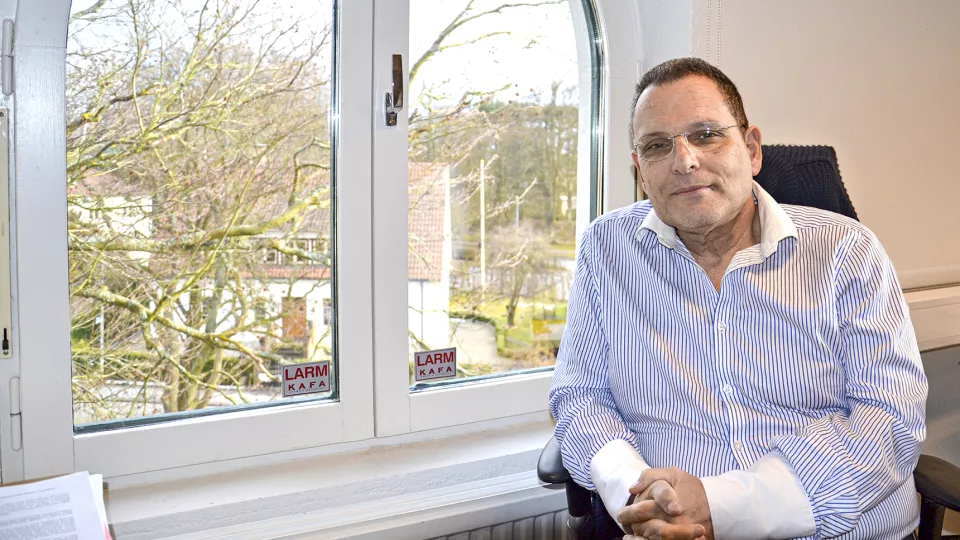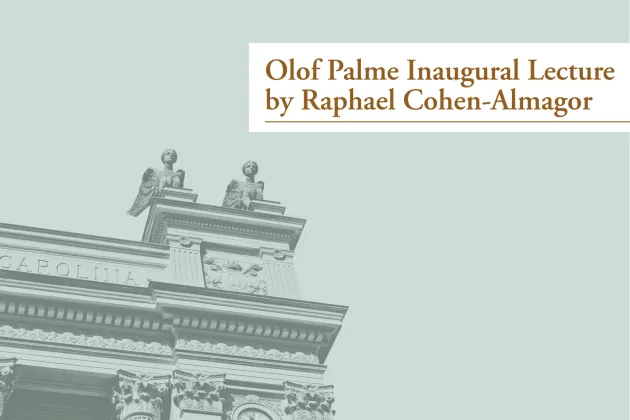LUM meets Raphael Cohen-Almagor in an attic room at the Centre for Advanced Middle Eastern Studies. On a desk in front of a window overlooking the Botanical Garden, journal manuscripts, book chapters and articles are stacked in neat piles.
“I am planning to finish several projects during my year here at Lund,” he says, gesturing to the piles of papers.
Multitasking in Research
Raphael Cohen-Almagor’s academic portfolio is unusually interdisciplinary: history, philosophy, media ethics, medical ethics and political science. Common themes to all his research are ethics, peace, justice and social responsibility.
For many years, he did fieldwork and worked on projects related to euthanasia. It can seem like a leap between that and his latest books about multiculturalism and liberalism.
“I hadn’t actually planned to write these books but when the UK Prime Minister David Cameron argued in a much talked-about speech in 2011 that multiculturalism had failed, that it threatens democracy and instigates extremism, I felt I had to approach the topic,” he says.
Raphael Cohen-Almagor argues that Cameron’s statements were both incorrect and unjust. He is of the opinion that multiculturalism is compatible with liberalism as long as values are taken into account such as doing no harm and respecting others and upholding the right to education, and that there are good opportunities to resolve conflicts in society.
Canada Is Top of the List
The country in which multiculturalism functions best is, according to Cohen-Almagor, Canada.
“Just as the most fundamental value in the USA is freedom, the UK tradition and Israel security, Canada’s most important value is multiculturalism. Canadian society is imbued with regard for multiculturalism and the importance of respecting it,” he says.
France has big problems with incorporating multiculturalism into its society, argues Cohen-Almagor. The slogans of the French Revolution, liberté, egalité, fraternité, (freedom, equality, fraternity) have been replaced successively by indivisibilité, sécurité, laïcité (indivisibility, security, secularity), he says. Furthermore, France’s ban on religious symbols in public places is discriminatory, unreasonable and unfair.
The Importance of Financial Means
“The only group to be noticeably affected by the ban are Muslims. For many, it is a considerable violation to be forced to take off their veil,” he says. The Jewish and Christian symbols are smaller in comparison and can easily be hidden under clothing.
Moreover, he argues that Jews and Christians in France often have the financial means to send their children to private religious schools if they do not want to submit to the ban on religious symbols in public places. This possibility is seldom open to Muslims, he points out. Their migration to France is more recent, and they are less organised and less financially established.
The argument that head coverings must be removed because they represent patriarchal oppression is not sustainable, he argues.
“Anyone who says that disempowers adult women who have chosen to wear the veil,” he says, showing his latest book on France’s relationship with the burqa and niqab, the most concealing forms of Muslim women’s clothing.
The Road to Peace
The issue closest to Raphael Cohen-Almagor’s heart is peace between Israelis and Palestinians. He has been an activist for peace since his youth, and in Lund he plans to complete his biggest project yet, about the failure of the peace process between Israel and Palestine.
Over a period of several years, he has interviewed influential Israelis, Palestinians, Jordanians, Americans, Egyptians, Norwegians, Swedes and Brits who have all played a part in the peace negotiations in some form, from the Oslo Accords to the present day. So far, he has conducted 82 interviews with high-profile diplomats and politicians.
“On average, each interview has taken two hours and I now have over 1,400 pages of material to compile,” says Raphael Cohen-Almagor and reveals that the book will result in what he believes are the only possible solutions for peace between Israelis and Palestinians.
The Olof Palme Visiting Professorship
The professorship has, since 1989, been given to internationally prominent researchers within the humanities, political science, theology or law.
This is the fourth time it has been given to Lund University. Previously, lawyer Manfred Nowak and political scientists Richard Ned Lebow and Alexander Wendt have been invited to stay at LU for a year each.
About LUM
The first edition of Lund University Magazine – LUM – was published 1968. Today, the magazine reaches all employees and almost as many people outside the university. The magazine is published six times a year. Editor Jan Olsson.





